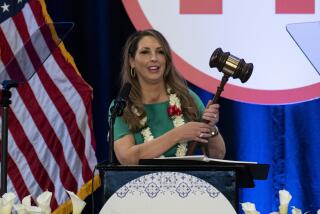On the Media: It’s time for NPR to broaden its mix
- Share via
Juan Williams suggested he’d been thrown under the bus of liberal orthodoxy when NPR fired him a couple of months ago. Now the NPR exec who fired Williams reports feeling bus-whacked herself. That’s what Ellen Weiss told me after the radio network forced her aside this week for her too-hasty dismissal of commentator Williams.
So we’ve got two corpses in a potboiler that might be called “Muslims on a Plane.”
The formal review NPR completed this week and a list of proposed reforms, including a new ethics code, goes part of the way toward preserving the radio network’s place as a trusted news source. But a reach for greater diversity in its ranks, including ideologically, would put NPR on more solid ground going forward. That might also set an example for other big media organizations, fighting to hold on to the public’s loyalty.
The loudest of NPR’s critics live by another kind of code when they face a crisis: close ranks, hunker down and attack any and all opponents. So it’s a bit laughable to hear Williams (as badly as NPR handled his case) sniping about his former employer’s alleged ideological purism, as he sits behind a microphone at Fox News. That’s his new employer and the outlet that gives daily lessons on ideological rigidity.
That does not in any way forgive NPR’s misstep in the case of Williams, called on the carpet when he said that people in “Muslim garb” on airplanes made him nervous. The radio network went wrong by enforcing a fuzzy (if even discernible) line between permitted “analysis” and forbidden “personal opinions.” And it didn’t apply that standard with much fervor when it came to some of its other opinion-making commentators.
Because of those mistakes, NPR would be wise to do more than just give lip service to some of the reforms it proposed Thursday. The radio network promised to fix its ethics rules in consultation with outside experts. It said it would review rules governing employees who appear on other media.
One of the most important promises came near the end of a densely written, bureaucratic, two-page news release. In it, the 17-member board pledged that NPR would: “Ensure that its practices encourage a broad range of viewpoints to assist its decision-making, support its mission and reflect the diversity of its national audiences.”
Although the statement doesn’t spell it out, that “broad range of viewpoints” includes ideological ones, an NPR insider told me. The NPR board is said to be intent on doing more to assure the network isn’t seen as a bastion for liberals.
Some board members have expressed concern privately that ideological insularity might hurt them as they try to fight off renewed calls in Congress to cut off NPR’s federal funding. Past NPR boards included solid conservative membership, the kinds of figures who could go to Capitol Hill and act as liaisons to Republican members of Congress, but the current one does not, the insider told me.
So NPR prepares for the fight to save its funding without the kind of ambassadors who would have a better chance of winning the day with congressional Republican, who just took the majority in the House of Representatives.
I’ve written in the past how NPR, despite protests about its liberal orthodoxy, has been an island of balance and calm compared with the histrionic sea created by cable TV and AM radio.
Anyone who has been listening in recent weeks has heard NPR reporters treating the new Republican majority in Congress with considerable respect. On Thursday, political correspondent Don Gonyea profiled David Schweikert, a GOP House freshman from Arizona. Schweikert’s message against big government spending came through loud and clear. The piece also discussed the finer points of adjusting to life in the House. Gonyea treated his subject as a human being. He didn’t try to shoot down or belittle anything the new lawmaker had to say.
That kind of civil treatment won’t necessarily win many fans in Media Crazyland, where every story has to be about conflict and every person a hero or villain. But the measured tone clearly has a growing legion of fans. The audience for public radio has increased 60% over the last decade. Forty million listeners now tune in each week.
Still, there’s room for NPR to do better and to assure its appeal continues to grow. That should come from a continuation of honest reporting and perhaps from new initiatives, such as expanded coverage of state government that the network recently announced.
But maybe, in today’s world of constant second-guessing, NPR will have to move in another novel direction. This week’s news release calls for that “broad range of viewpoints.”
That admonition could be pushed beyond the board room down to the radio network’s newsroom. Time for an affirmative action program to bring more conservatives to NPR, and other big media?
It’s an idea worth talking about. And a column for another day.
Twitter: latimesrainey
More to Read
Sign up for Essential California
The most important California stories and recommendations in your inbox every morning.
You may occasionally receive promotional content from the Los Angeles Times.










